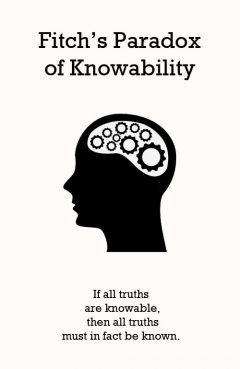Fitch's Paradox of Knowability

Release Date: //
Country of Release:
Length:
MPAA:
Medium: Paradox
Genre:
Release Message: If all truths are knowable, then all truths must in fact be known. Authored by Frederic Brenton Fitch.
Description: Fitch's paradox of knowability is one of the fundamental puzzles of epistemic logic. It provides a challenge to the knowability thesis, which states that any truth is, in principle, knowable. The paradox is that this assumption implies the omniscience principle, which asserts that any truth is known. Essentially, Fitch's paradox asserts that the existence of an unknown truth is unknowable. So if all truths were knowable, it would follow that all truths are in fact known. The paradox is of concern for verificationist or anti-realist accounts of truth, for which the knowability thesis is very plausible, but the omniscience principle is very implausible. The paradox appeared as a minor theorem in a 1963 paper by Frederic Fitch, "A Logical Analysis of Some Value Concepts". Other than the knowability thesis, his proof makes only modest assumptions on the modal nature of knowledge and of possibility. He also generalized the proof to different modalities. It resurfaced in 1979 when W.D. Hart wrote that Fitch's proof was an "unjustly neglected logical gem".